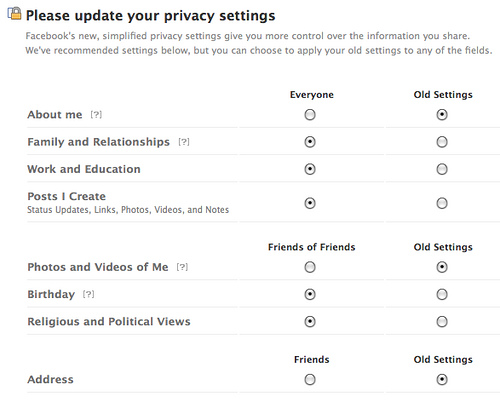
[Updated: Added Facebook’s response.]
Last week, giant social network company Facebook rolled out an overhaul of its privacy settings and VentureBeat reporter Kim-Mai Cutler dubbed Facebook “the only place where a user can control how narrowly or broadly they want to share their interests and life.” That’s certainly part of Facebook’s appeal.
Search Engine Land editor Danny Sullivan, however, dubbed the new privacy settings “exhausting” to deal with. By default, Facebook’s new settings allow anyone on the site to see a user’s posts, as well as other personal information such as religious or political views.
On Sunday, influential entrepreneur Jason Calacanis, currently the founder and CEO of search engine Mahalo, charged the company with something more that clumsiness at user interfaces. The outspoken Calacanis flat-out accused Facebook of “tricking” its users into making their personal content available both to Facebook’s internal search engine, and ultimately to Google and other Internet search sites, in order to boost the site’s usage.
Such a move would go against Facebook’s tradition as a walled garden, where strangers can’t find its members personal updates and photo posts just by searching.
Calacanis made his claim on a private mailing list he maintains. Here’s an edit of his pages-long message:
Facebook proved again this week that they are either the most unethical or clueless internet company in the world. When you logged into Facebook this week you were road blocked with a popup explaining that they “we’re making some changes to give you more control.” I simply clicked through the message. How important could it be?
In this case, if you simply click through the windows you’ve exposedall of your private Facebook information, including comments, friends,pictures and status updates, to “everyone.”
Why on earth would anyone do that with their Facebook page? The entire purpose of Facebook since inception has been to share your information with a small group of people in your private network. Everyone knows that and everyone expects that. In fact, Facebook’s success is largely based on the fact that people feel safe putting their private information on Facebook.
When you do get to the second page a series of confusing radio buttons default–yes defaults–to giving everyone access to your social graph. An average user, certainly, has no idea what is going on by these changes.
So why is Facebook trying to trick their users?
Simple: search results.
Facebook is trying to dupe hundreds of millions of users they’ve spent years attracting into exposing their data for Facebook’s personal gain: pageviews. Yes, Facebook is tricking us into exposing all our items so that those personal items get indexed in search engines–including Facebook’s–in order to drive more traffic to Facebook.
I’ve asked Facebook to respond to Calacanis’ claims. I’ll update this post when I hear back.
Update: Here’s the comment from Facebook. “In less than a week’s time, many of Facebook’s 350 million users have personalized their control over the information they share and preliminary statistics support a conclusion opposite from Jason’s speculation. Our analysis shows that users understand the changes we’ve asked them to contemplate and our straightforward privacy customization tools are working. Throughout this process, Facebook has been consistently transparent and accessible — beginning with our July announcement of the new model for privacy control; our industry leading system of notice-and-comment for our updated privacy policy; our founder Mark Zuckerberg’s Dec. 1 open letter to users; and our robust outreach to regulators, privacy advocates, the press, and most importantly our users. The assertion that these changes have occurred in the shadows is ludicrous — to our knowledge, this has been the broadest and most widely publicized privacy awareness and user empowerment campaign any Internet service has ever created. Furthermore, we do not recommend the “Everyone” setting for people who have customized their settings previously – a fact that Calacanis apparently overlooks. Facebook’s model of personalized control makes the notion of a “default” setting obsolete because users can decide who sees every photo, link or status update they wish to post. We educate users with tool-tips and confirmation dialogs at the time they share, which helps to ensure that they are sharing with the audience they want and know how to adjust their settings at the right time and place. We’re also including contextual messages about privacy throughout the new user experience and adding a section about privacy to our New User Guide. That section will link to our new Privacy Center, a comprehensive privacy guide that helps user understand and control how they share information.”
[Screenshot: Danny Sullivan]

